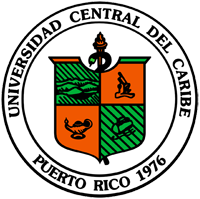787-798-3001
info@uccaribe.edu
Curricular Axis (Curriculum Drivers)
-
Basic Sciences (Basic Sciences): Strong emphasis on sciences with an organ system approach
-
Clinical Skills (Clinical Sciences): Utilize history taking, physical examination, diagnostic imaging and laboratory testing to collect data, and apply clinical reasoning skills to assess that data in order to arrive at a diagnosis, so the students can be clinically competent primary health care providers and chiropractic clinicians.
-
Research and long life learning practices (Information Literacy and Research Methodology): Embrace emerging evidence that support the profession’s historical foundation, and promote the utilization and interpretation of evidence in clinical practice in developing appropriate evidence-based treatment plans.
-
Chiropractic Sciences (Foundations & Clinical Sciences)): Broad perspective on chiropractic scope from theories to practice techniques
-
Social Context/Community Engagement (Service Learning): Promote disease prevention and wellness by treating the whole person. Assess the need for health promotion and disease prevention strategies to address the needs of patients and communities, with an initial approach of functional medicine.
-
Ethics/Professional Behavior (Professional Practice): Understand, comply with, and rigorously implement accepted standards of professional ethics and jurisprudence.
-
Business and Professional Foundations (Professional Practice): Be knowledgeable of regulatory issues, steps in documentation of medical procedures and records, appropriate billing and coding, and other business related practices.
-
Interprofessional Experiences: (Interprofessional education) Collaborate with other healthcare professionals for optimal patient care; manage patient health care needs, and co-manage business roles in an interdisciplinary environment.
-
System based practice and professional development: reflective practice, awareness of self-strengths and weakness, quality improvement and patient safety as a daily goal.
Competencies
-
Assessment and diagnosis
-
Management plan
-
Health promotion and disease prevention
-
Communication and record keeping
-
Professional ethics and jurisprudence
-
Information and technology literacy (practice-based learning and improvement)
-
Chiropractic adjustment/manipulation
-
Interprofessional education
-
Systems-Based Practice and professional development
Guiding Principles for our Curriculum Design
-
True to our mission, values, and drivers
-
Integration of health, disease (normal and abnormal), and intervention
-
An “adult learner” environment that values independent study and self-directed learning
-
Conceptual knowledge in action, not memorizing facts
-
Early meaningful patient interactions with emphasis on both individual and population health
-
Emphasis on scholarship, critical thinking, and lifelong learning
-
Focused on learning rather than teaching
-
Assessment drives learning
Graduation requirements
Successful completion of the eight academic semesters will be required for graduation. This includes having obtained at least a grade of C in all required courses; and to pass the NBCE Part 1, 2 and 3. In order to obtain Doctor of Chiropractic degree from the UCC, the student must be enrolled in this institution for the final two academic years.
Please refer to other specific requirements for student promotion and graduation as contained in the Regulations for Student Evaluation and Promotion of the School of Chiropractic.
